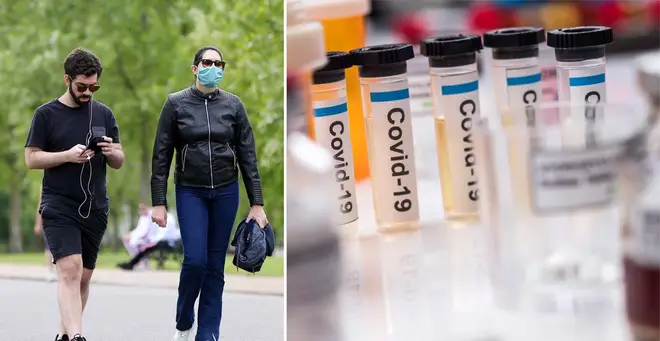On Air Now
Early Breakfast with Lindsey Russell 4am - 6:30am
15 May 2020, 08:56 | Updated: 15 May 2020, 15:21

Researchers at the University of Manchester believe that over 25 per cent of the population may have been infected with the disease before 19 April.
Researchers have claimed that over a quarter of people in the UK may have had coronavirus, with most having no symptoms.
In a new study by the University of Manchester, experts say more than 25 per cent of the population may have been infected before 19 April, as reported by The Sun.
Read more: Coronavirus antibody test that could help ease lockdown approved in UK
The majority of these people wouldn't have displayed classic Covid-19 symptoms such as fever and persistent cough.

The study analysed data from 144 local authorities, and calculated the R-value - which is the number of people infected by one person with coronavirus - within each.
They estimated that each person infected over three others in the middle of March, but that it has now fallen to well below one.
Dr Adrian Heald - one of the researchers - said: "Covid-19 is a highly infectious condition and very dangerous for a small group of people.
"However a much larger group seem to have low or no symptoms and have been unreported.
"This study tries to provide an estimate of the number of historic infections – and gives us all a glimmer of hope that there may be light at the end of the tunnel.
Read more: Martin Lewis issues warning for holidaymakers about claiming refunds for cancelled flights
"We show how effective social distancing and lockdown has been. Though this is a tragedy, it could have been far worse."
The findings, which have been published in the International Journal of Clinical Practice, extrapolated data from the local authorities and estimated around 25 per cent of the population may have been infected.

Boris Johnson reveals his end of lockdown plan in-full
Mike Stedman, from Res Consortium, who carried out the data analysis, said: "Using our experience working with the NHS on improving patient services, we conducted this work in our own time as we felt we could make a valuable contribution to the public and policy makers by calculating the progression in the local and national daily infection rate.
"The figures are not perfect, with the numbers of severely ill patients as a proportion of the total cases being used as a market for estimates of wider infection.
"Only extensive antibody testing could give us a more accurate picture - but as that is only just becoming available, we believe this form of modelling is important in informing the best approach to unlocking the population."
Read more about the study on the University of Manchester website.
NOW READ: